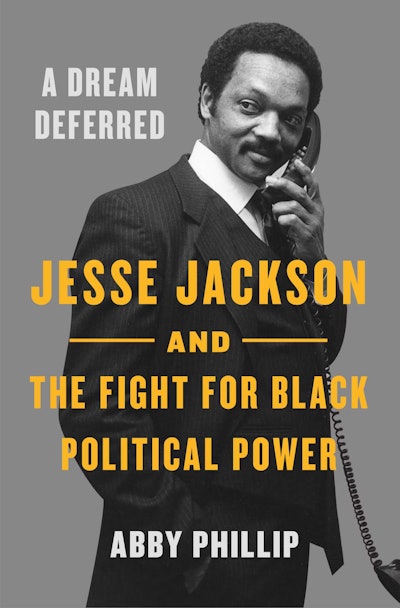Book Review: A Dream Deferred: Jesse Jackson and the Fight for Black Political Power
By Abby D. Phillip

Phillip's narrative brilliantly traces how Jackson's educational experiences—from his painful isolation at the University of Illinois to his political awakening at North Carolina A&T—forged the progressive ideology that would later animate both major political parties. Unlike the Ivy League-educated elite of the civil rights establishment, Jackson's path through A&T, a historically Black college and university (HBCU) not considered among "the top Black schools" at the time, gave him an outsider's perspective that would prove prophetic.
As Phillip documents, Jackson's time at A&T under the mentorship of President Samuel DeWitt Proctor transformed him from a disheartened transfer student into a revolutionary organizer. The university became his laboratory for direct action, where he led eat-ins, wade-ins, and mass protests that eventually desegregated Greensboro. More significantly, it was where Jackson absorbed the teachings of intellectual giants like Dr. Benjamin Mays, Dr. Howard Thurman, and Dr. Proctor—figures who, Jackson reflects, influenced him "to a greater degree than I did by the athletic heroes."
This educational foundation informed Jackson's later progressive platform, which Phillip argues presciently set the agenda for the modern Democratic Party. Jackson championed universal healthcare, Palestinian statehood, gender equity in political representation, and economic populism—positions that branded him a radical in the 1980s but have since become defining features of contemporary American politics. As Senator Bernie Sanders puts it in the book: "Jesse Jackson is one of the very most significant political leaders in this country in the last 100 years."
Phillip pays careful attention to how Jackson's commitment to educational access and equity ran throughout his political career. His advocacy for investments in higher education for minorities, his push for tuition-free quality education, and his work to unite parents, students, and teachers in common pursuit of educational excellence all emerged from his own transformative college experience. The book reveals how Jackson's Operation PUSH created a "political education division" that became a venue for Black celebrities and politicians to hold panels on civic engagement, essentially creating an alternative educational infrastructure for Black political empowerment.
The author notes that when Jackson competed in presidential primaries, education policy became a centerpiece of his platform. He would critique states ranking "number 50 out of 50 in education" while advocating for Black colleges and universities as engines of social mobility. This wasn't abstract policy—it was deeply personal, rooted in his own rescue by an HBCU president who made "some very special arrangements" to give an ambitious but broke student a second chance.
Perhaps the most compelling throughline in Phillip's narrative is Jackson's mentorship of Reverend Al Sharpton, who his son Congressman Jesse Jackson Jr. aptly described to me years ago, as his father's "most serious student." This relationship, which Phillip explores through multiple interviews with Sharpton himself, reveals how Jackson's intellectual and tactical approach to civil rights activism was transmitted to a new generation.
Sharpton's reflections throughout the book provide crucial insights into Jackson's character and methods. He notes that both he and Jackson were "outsiders" to the civil rights establishment—Jackson because "he came out of a broken home" and was "born out of wedlock," Sharpton because of similar family circumstances. This shared experience of marginalization, Phillip suggests, created a bond between mentor and protégé that went beyond mere political alliance.
The book chronicles several pivotal moments in their relationship. During the 1992 presidential campaign, when Jackson faced the wrenching decision of whether to endorse Bill Clinton—a moderate who represented everything Jackson's progressive coalition opposed—it was the young, "hotter headed and idealistic" Sharpton who challenged him. "Everybody around Jesse didn't want him to endorse Bill Clinton," Sharpton recalled. But Jackson, ever the pragmatist, told his protégé: "Al, sometimes you gotta go for the greater good. We got to get as much as we can... Sometimes you got to gain yards. Let's gain some yards, homeboy."
This football metaphor—characteristic of Jackson's athletic background—reveals the pedagogical method that made him such an effective mentor. Jackson taught Sharpton not just ideology but strategy; not just principles, but tactics. He showed him when to stand firm and when to compromise; how to build coalitions and when to walk away.
The mentorship continued through the complex Obama era, when both Jackson and Sharpton navigated the tension between their pioneering role in making a Black presidency possible and their complicated relationship with Obama himself. Sharpton served as intermediary, understanding "the differences" and "some of the Chicago stuff," while advocating that "Rev. Jackson ought to be respected." At the 2024 Democratic National Convention, as a video of Jackson's most memorable moments played and tears streamed down the faces of the delegates who gathered in the United Center, it was Sharpton who flanked his wheelchair-bound mentor alongside Jackson's sons—a visual representation of the generational continuity Jackson had achieved through mentorship.
What distinguishes Phillip's biography is her recognition that Jackson's true genius lay not just in his oratory or organizing, but in his role as political educator. From his student body presidency at A&T to his Saturday morning pulpit at Rainbow PUSH, Jackson created spaces for collective learning and consciousness-raising. As Representative Pramila Jayapal, chair of the Congressional Progressive Caucus, observed at a 2024 gathering honoring Jackson: "The Progressive Caucus came from the vision and work and representation of the Rev. Jesse Jackson... When I think about the Rainbow PUSH Coalition, I think about it as the precursor to the modern progressive movement. It was the first time we have seen in modern history economic, racial and gender justice put together in an agenda that lifted up everybody."
This pedagogical approach—teaching through doing, learning through struggle—was something Jackson absorbed from his college experiences and from mentors like Proctor, who had himself attended Boston University with Dr. Martin Luther King Jr. Jackson then replicated this mentorship model with figures like Sharpton, creating a chain of intellectual and political transmission that continues to shape American progressivism.
Phillip's book arrives at a crucial moment, as the Democratic Party grapples with internal divisions between centrists and progressives—divisions that Jackson's career both anticipated and helped create. Her reporting reveals that both camps "were strongly influenced by Jackson's progressive ideas," even as they claim different inheritances from his legacy.
The author's access to Jackson during the COVID-19 pandemic, when he was already battling Parkinson's disease, adds poignancy to the narrative. Her description of his cluttered office—"littered with the memorabilia of a lifetime of public service"—becomes a metaphor for a legacy that risks being buried under its own weight. Yet Phillip's careful excavation of that legacy, particularly through the lens of education and mentorship, reveals its enduring relevance.
A Dream Deferred is essential reading for anyone seeking to understand the intellectual foundations of contemporary American progressivism. Phillip has written not just a political biography but an educational history—a chronicle of how ideas developed in HBCU classrooms and civil rights struggles became the common sense of a new generation.
The book's portrait of the Jackson-Sharpton mentorship relationship offers a model for how progressive movements sustain themselves across generations: not through institutional power alone, but through the patient work of education, the transmission of tactical wisdom, and the recognition that "sometimes you gotta gain yards." As Jackson's own mentors—Mays, Thurman, Proctor—shaped him, so he shaped Sharpton, who has in turn shaped others.
Jackson's greatest legacy may not be his presidential campaigns or even his policy prescience, but his commitment to progressive causes, like education as liberation and mentorship as revolution. In that sense, the dream may be deferred, but the lesson plan endures.
______
Dr. Jamal Watson is a higher education journalist and the former executive editor of Diverse: Issues In Higher Education. He is currently a professor and associate dean of graduate studies at Trinity Washington University and is the author of The Student Debt Crisis: America’s Moral Urgency and a forthcoming biography on Reverend Al Sharpton.

















